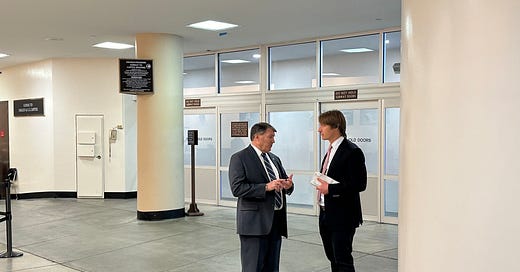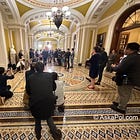
psst: Ask a Pol AUDIO IS 100% FREE! If you can’t access our raw interviews, try going directly to our site (Ask a Pol dot com). For. Free. Contact us if troubles persist.
Who?
Sen. Mike Rounds (R-SD) — Intelligence and Armed Services Committees
LISTEN: Laslo & Rounds
Ask a Pol asks:
With the Pentagon having a nearly trillion-dollar budget, how do they not address the persistent problem of UAPs flying over sensitive military and nuclear sites?
Key Rounds:
“Well, if it’s ours, they may not want to address it,” Rounds exclusively tells Ask a Pol.
Caught our ear:
“As near as I can tell based on everything I’ve been able to glean so far, the biggest concern that we should have is either our very sensitive programs being opened up or other countries’ very sensitive programs being actively engaged. Both of which would be of concern to me,” Rounds says. “So far it’s a matter of, let’s make sure that we don’t disclose what we actually have capabilities for in our investigations. Second of all, if there are some items out there that are not ours, where are all those capabilities coming from? Which other country may very well have them, and what are we doing to counter them? Those are the — there’s always the possibility that we haven’t figured out where all of this stuff is coming from.”
ICYMI — what Gillibrand told us
Content posted at AskaPol.com is copyrighted. Use our original content to move the story forward. And, please, link to us.
Ask a Pol — asking your lawmakers your questions at your US Capitol.
Below find a rough transcript of Ask a Pol’s exclusive interview with Sen. Mike Rounds (R-SD), slightly edited for clarity.
TRANSCRIPT: Sen. Mike Rounds
Matt Laslo: “Hey, did you see that Joint Chiefs of Staff statement — they sent out something last May — about all these UAP sightings? Kind of — you don’t look familiar with it?”
Mike Rounds: “I’m trying to think of which one it was. I mean, I’ve been watching the UAP stuff pretty carefully, but I’m trying to place which one you’re…”
ML: “Well, it just surprised me, because it’s on the Joint Chiefs’ radar. What do you make of that? Like, has…”
MR: “Well, I’m not sure which one it is. Fill me in a little bit more — the Joint Chiefs?”
ML: “Well, it’s from last May, and it seemed like they were…”
MR: “Last May?”
Rounds laughs…
SUBSCRIBER-ONLY CONTENT*
*Student? Lost your gig? Hard times? Been there. Got you. No questions asked. Just ping us.
ML: “Yeah, that seemed like they were trying to facilitate…”
Rounds still laughing.
MR: “I’m missing it. I’m sorry.”
ML: “But it seemed like they were trying to facilitate what AARO was doing, and they just kind of mentioned that they’ve seen a spike. Like, how worried are you that we still are having these sightings over sensitive US military infrastructure?”
MR: “Well, let me share. Here’s — look, I sit on Armed Services. I sit on Intel. I care about the UAP issues, okay?”
ML: “Yeah.”
MR: “As near as I can tell based on everything I’ve been able to glean so far, the biggest concern that we should have is either our very sensitive programs being opened up or other countries’ very sensitive programs being actively engaged. Both of which would be of concern to me. So far it’s a matter of, let’s make sure that we don’t disclose what we actually have capabilities for in our investigations. Second of all, if there are some items out there that are not ours, where are all those capabilities coming from? Which other country may very well have them, and what are we doing to counter them? Those are the — there’s always the possibility that we haven’t figured out where all of this stuff is coming from. If we can’t answer ’em, those are the two things that I worry about: is that we either expose one of our very sensitive programs or we’ve got an adversary who’s got a very unique one that we haven’t been able to explain yet.”
ML: “With the Pentagon having a nearly trillion-dollar budget, like, how do they not address this? How’s this been a persistent problem?”
MR: “Well, if it’s ours, they may not want to address it.”
ML: “Yeah, fair. ‘Preciate ya.”


















Share this post